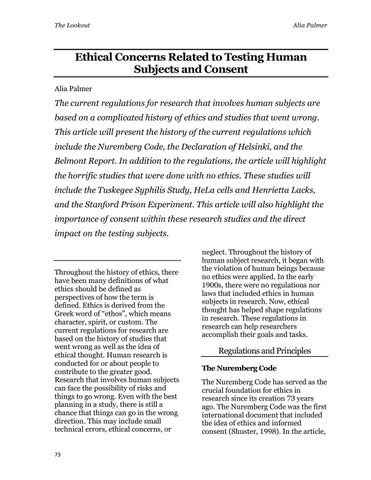The Lookout
Alia Palmer
Ethical Concerns Related to Testing Human Subjects and Consent Alia Palmer
The current regulations for research that involves human subjects are based on a complicated history of ethics and studies that went wrong. This article will present the history of the current regulations which include the Nuremberg Code, the Declaration of Helsinki, and the Belmont Report. In addition to the regulations, the article will highlight the horrific studies that were done with no ethics. These studies will include the Tuskegee Syphilis Study, HeLa cells and Henrietta Lacks, and the Stanford Prison Experiment. This article will also highlight the importance of consent within these research studies and the direct impact on the testing subjects.
Throughout the history of ethics, there have been many definitions of what ethics should be defined as perspectives of how the term is defined. Ethics is derived from the Greek word of “ethos”, which means character, spirit, or custom. The current regulations for research are based on the history of studies that went wrong as well as the idea of ethical thought. Human research is conducted for or about people to contribute to the greater good. Research that involves human subjects can face the possibility of risks and things to go wrong. Even with the best planning in a study, there is still a chance that things can go in the wrong direction. This may include small technical errors, ethical concerns, or 73
neglect. Throughout the history of human subject research, it began with the violation of human beings because no ethics were applied. In the early 1900s, there were no regulations nor laws that included ethics in human subjects in research. Now, ethical thought has helped shape regulations in research. These regulations in research can help researchers accomplish their goals and tasks.
Regulations and Principles The Nuremberg Code The Nuremberg Code has served as the crucial foundation for ethics in research since its creation 73 years ago. The Nuremberg Code was the first international document that included the idea of ethics and informed consent (Shuster, 1998). In the article,




